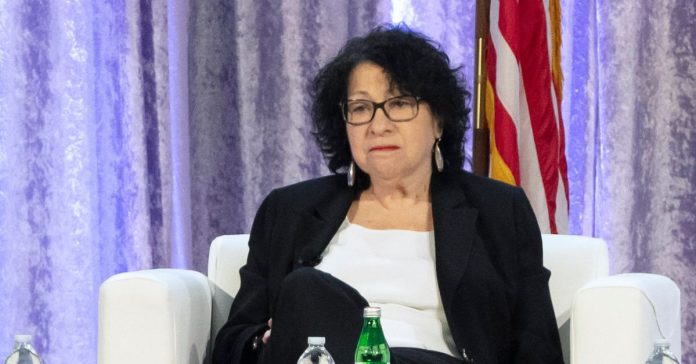
FILE – Supreme Court Justice Sonia Sotomayor speaks with retired U.S. Appeals Court Judge Thomas Griffith, not shown, during a panel discussion at the winter meeting of the National Governors Association, Feb. 23, 2024, in Washington. (AP Photo/Mark Schiefelbein, File)
Supreme Court Justice Sonia Sotomayor chastised six of her fellow justices for inviting “chaos and crisis” by upholding an “unreasoned” ruling and allowing Texas to regulate immigration at its borders over the objection of the federal government.
The Supreme Court ruled 6-3 Tuesday to allow Texas S.B. 4 to go into effect while the battle over its underlying legality plays out in court. The law, which authorizes Texas law enforcement to arrest anyone suspected of illegal border crossing and charge them with crimes ranging from misdemeanors to felonies, then to prosecute and punish with jail time or returning them to Mexico, is the harshest part of Republican Gov. Greg Abbott’s anti-immigration “Operation Lone Star.” Abbott’s policies have already been blamed for contributing to the death of a migrant woman and two children who drowned when Texas authorities prevented federal Border Patrol agents from rendering aid.
At its core, the legal battle over the law is a turf war. The federal government’s position is that immigration regulation is squarely within its sole jurisdiction. Texas, by contrast, says that it has a right to protect itself from “invasion” by those crossing the U.S.-Mexico border illegally.
On Feb. 29, Senior U.S. District Judge David Alan Ezra ruled against Texas, holding that S.B. 4 violates both the Supremacy Clause and Supreme Court precedent, conflicts directly with federal immigration law, and offends American foreign relations and treaty obligations. A few days later, the New Orleans-based Fifth U.S. Circuit Court of Appeals reversed Ezra’s ruling, then immediately issued a seven-day administrative stay of its ruling. The Supreme Court extended that stay until March 11, then vacated it Tuesday, thereby allowing the law to go into effect.
Justice Samuel Alito wrote for the six-member majority and said that the decision to dissolve the stay was motivated by a desire to be hands-off with the way the Fifth Circuit managed its own docket. Alito reasoned that because the stay had been “administrative, ” it would be “unwise to invite emergency litigation” at this early step in the case.
Sotomayor was not convinced. It is precisely at this time, she argued in a dissent joined by Justice Ketanji Brown Jackson, that the Court should have ruled to protect the federal-state balance of power and neutralize Texas’s efforts to intrude into matters of purely federal authority.
Sotomayor wrote that the district court got it right when it said S.B. 4 “amounts to ‘nullification of federal law and authority — a notion that is antithetical to the Constitution and has been unequivocally rejected by the federal courts since the Civil War.”” She recounted the procedural history of the case and slammed the Fifth Circuit for issuing an order, “with no reasoned analysis” that allows Texas to “immediately enforce its own law imposing criminal liability on thousands of noncitizens and requiring their removal to Mexico.”
Echoing the Biden administration’s briefs in the case, Sotomayor warned of the many pragmatic evils that would result from her colleagues’ ruling:
This law will disrupt sensitive foreign relations, frustrate the protection of individuals fleeing persecution, hamper active federal enforcement efforts, undermine federal agencies’ ability to detect and monitor imminent security threats, and deter noncitizens from reporting abuse or trafficking.
The justice continued, scolding the majority for giving “a green light to a law” that will “sow chaos” and is “likely unconstitutional” in the long run. Noting that the issues underlying the debate over S.B. 4 are serious and novel, Sotomayor urged “careful and reasoned consideration” of its constitutionality.
She also called out her fellow justices for couching their decision as one of mere docket management.
“Although the Court today expresses no view on whether Texas’s law is constitutional, and instead defers to a lower court’s management of its docket, the Court of Appeals abused its discretion by entering an unreasoned and indefinite administrative stay that altered the status quo,” she wrote, “This Court stands idle. Because I cannot, I dissent.”
She did not stop at generalizations, either.
Sotomayor detailed what was wrong with S.B. 4. Its intrusion into settled matters of federal authority not only conflicts with long-standing precedent, but also creates a practical problem for judges, she said.
“Strikingly, state judges must explicitly disregard any parallel federal immigration proceedings … on the basis that a federal determination regarding the immigration status of the defendant is pending or will be initiated,” she predicted.
“Procedure can be just as consequential as substance,” she wrote about the ruling.
“In my view, even a single day of the status quo disruption likely to be caused by S. B. 4 based on an unreasoned order is one day too many,” she continued, adding that the Fifth Circuit’s labeling its decision an “administrative stay” does not render the decision any less impactful.
Sotomayor also noted that in its analysis, the district court paid attention to Texas’s arguments.
“[T]he Court does not doubt the risk that cartels and drug trafficking pose to many people in Texas,” she said, “But as explained, Texas can (and does) already criminalize those activities.”
“The Court confronts a state immigration law that will transform the balance of power at the border and have life-altering consequences for noncitizens in Texas,” the justice warned, adding that the Fifth Circuit “opened the door” to the chaos and that her fellow justices made “the same mistake.”
Have a tip we should know? [email protected]

